|
SWISS MINE ACTION IN AFRICA
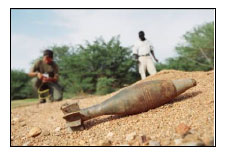
By
Walter Artho.
The FSD, Swiss Foundation for Mine
Action, founded in 1997, is one of the
foremost international mine action
organisations based in Geneva,
Switzerland. FSD's focus is on locating
and destroying landmines and unexploded
ordnance to prevent accidents. FSD
typically intervenes in countries that
emerge from war to prepare the ground for
further development initiatives. In many
cases, FSD provides support to existing
relief or reconstruction programmes.
In 2004, FSD received the "award for
merit 2004" from the UN World Food
Programme (WFP) in recognition of the
bravery and dedication of its teams, which
assisted humanitarian personnel when they
rescued victims to the bombing against UN
Headquarters in Bagdad on 19th August
2003.
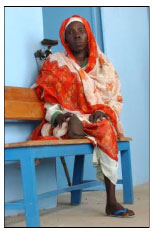 FSD
against mines FSD
against mines
To enable other humanitarian
assistance
FSD provides emergency support to many
other humanitarian organisations. This
involves risk assessments, clearing access
roads to hospitals and refugee camps, as
well as mine safety training for aid
workers in Angola, Sudan, Ethiopia,
Somalia or Burundi. As a standby-partner
for the United Nations World Food
Programme, FSD provides emergency demining
support upon request within 72 hours
world-wide.
To assist economical development
After a war, agricultural lands and
roads are often mined, hindering the
economic and social development. In the
case of Sudan, FSD every year clears
thousands of kilometers of roads and huge
areas of arable land so as to foster
economic development initiatives. Thanks
to FSD programs, people can start to
rebuild their livelihoods after long
periods of civil strife and unrest.
To assist political re-integration
in areas of conflicts
Humanitarian mine action is often an
integrated part of larger peace-building
initiatives, such as in Burundi. Clearing
explosive remnants of war that threaten
the local population with teams of
deminers that integrate former soldiers
and combatants is often a first step
towards reconciliation. Also, landmines
and bombs must be cleared so that refugees
and displaces people may return to their
former homes safely.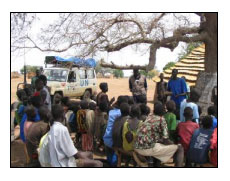
How does FSD operate?
Local capacity building
Clearing landmines after a war may take
years or even decades, and internationally
financed demining programmes are often
short in scope and time. For this reason,
countries affected by landmines need their
own local demining capacity that may
sustain efforts for the years to come.
The focus of FSD programmes is on local
capacity building: FSD recruits its mine
action staff directly in the countries
affected by landmines. Whenever possible,
FSD recruits former combatants and
soldiers (including former child
soldiers). They are trained by
international FSD experts and later
supervised by experienced FSD
supervisors.
FSD has so far trained thousands of
locally recruited deminers, operators,
specialized paramedics and support staff.
In most cases, locally recruited staff
replace international experts at all
management levels of a FSD demining
programme within a few years.
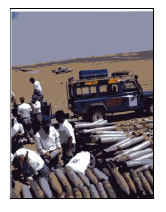 Integration
with national or international
reconstruction initiatives Integration
with national or international
reconstruction initiatives
The FSD rarely builds stand-alone
programmes. In most cases, FSD ties its
projects to other humanitarian or
development initiatives and works hand in
hand with major international
humanitiarian organisations and
development agencies. FSD demining
projects support infrastructure and road
reconstruction efforts, clear airports,
acces to water and schools.
FSD in Africa
FSD saves lives and stops the suffering
of children, women and men, subjected to
daily threats of mines and unexploded
ordnances in different countries of
Africa. Major countries of intervention so
far include Angola, Burundi, DR Congo,
Ethiopia, Somalia and Sudan.
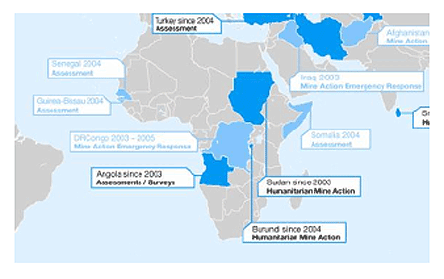
1 Programmes of FSD in Africa in
2005
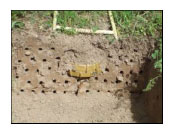 Funding
the battle against mines Funding
the battle against mines
Sources of funds
The mine action service of FSD is
funded directly by international
organisations or funds from donors.
International organisations such as the
International Committee of the Red Cross
(ICRC), the Organisation for Security and
Cooperation in Europe (OSCE) and various
UN agencies including the United Nations
Development Programme (UNDP), World Food
Programme (WFP), and the United Nations
Mine Action Service (UNMAS) have directly
been funding actions of FSD also provides
services to governments of countries
affected by landmines.
The governments of Australia, Canada,
Japan, Switzerland and other countries
regularly contribute to the humanitarian
demining projects. FSD also receives funds
from foundations and private sources.
Efficient use of funds
90 % of FSD's funds are spent on
demining work in the field, mostly in
Africa. Among the major cost factors are
salaries for demining and support staff in
the field, and equipment adapted to the
task at hand. For the sake of efficiency,
FSD use state-of-the art demining
equipment, including specific body
protection for its operators, high-tech
navigational systems, a fleet of
mine-protected vehicles, and various types
of demining machinery including small,
medium and heavy flails and protected
excavators. 10 % of FSD's funds are
allocated to its headquarters that
provides overall coordination, financial
controls and programme support.
Control
FSD is a private humanitarian
foundation under direct supervision of the
Swiss government. Since 2003, FSD has been
awarded the ZEWO quality logo as a
humanitarian organisation that "merits
trust". FSD reports to Swiss GAAP RPC 21
accounting standards. Its accounts are
audited by PricewaterhouseCoopers.
Web links:
FSD's website: http://www.fsd.ch
Donations for FSD: http://www.fsd.ch/customers/svm/svm-web.nsf/Frontpage?Readform&A4
|

 FSD
against mines
FSD
against mines
 Integration
with national or international
reconstruction initiatives
Integration
with national or international
reconstruction initiatives
 Funding
the battle against mines
Funding
the battle against mines